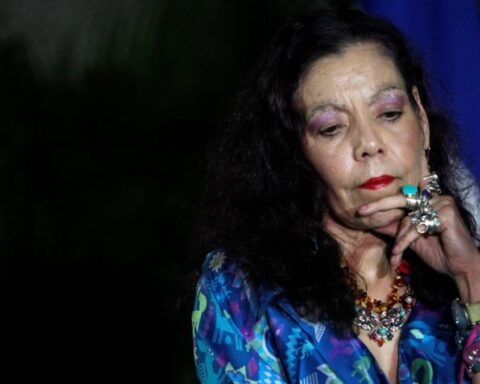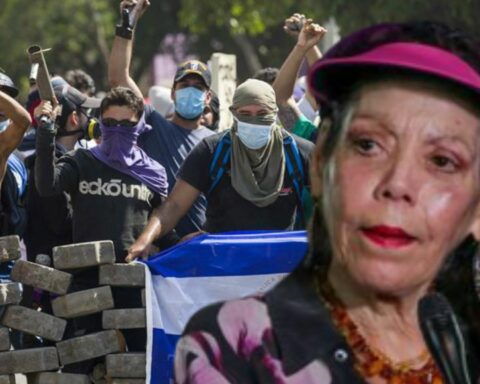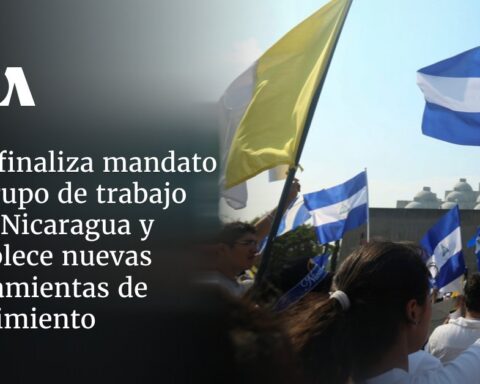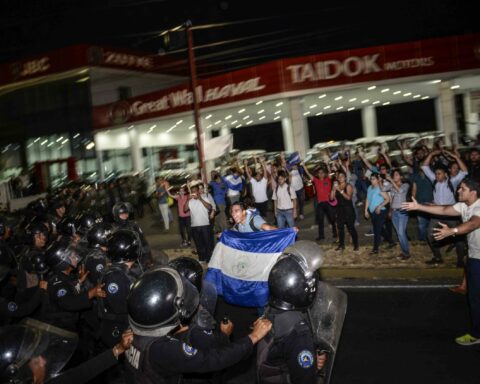The last chapter of the controversy over the entry of Russian troops into Nicaragua for military exercises for humanitarian purposes, was settled with the ratification this Tuesday, June 14, in the National Assembly, controlled by the regime, of the decree issued by Daniel Ortega authorizing the arrival of these military personnel, along with others from Venezuela, Cuba, the United States, and Central America.
The controversy detonated after the propaganda of the Government of Vladimir Putin, on Russian state television, used Ortega’s decree on the entry of military troops from his country into Nicaragua, to send a message of threat to the United States. “If American missile systems can get close to Moscow from the territory of Ukraine, it’s time for Russia to deploy something powerful closer to an American city,” Russian official TV presenter Olga Skabeeva said.
The civilian consultant on security and defense issues, Roberto Cajina, interviewed on the program Tonight by Carlos Fernando Chamorro, ruled out that the decree implies an increase in the Russian military presence in Nicaragua or a threat to the United States.
Cajina, however, highlighted the high level of secrecy in military relations between the Kremlin and the regime of Daniel Ortega and Rosario Murillo, which includes the lack of information on the results of these exercises and on the operation of the Russian satellite base. that operates in Nejapa and the police training center in Las Colinas.
How do you interpret the reaction of the United States, which indicated that the entry of Russian troops was a provocation, although at the same time it recognized that they are routine operations, and that of Costa Rica, saying that they are concerned?
Both are oversized and also reflect some ignorance. Perhaps I understand it in the case of the president of Costa Rica, but in the case of the United States, which keeps intelligence information up to date; he knows that these decrees for the entry of foreign troops and the departure of national troops abroad from Nicaragua is a routine procedure, as established in article 92 of the Political Constitution of Nicaragua. This is requested by the President of the Republic and ratified by the National Assembly. In fact, things don’t work exactly that way, because whoever does the planning of troop inflows and outflows is the Army, which has no legislative powers, it passes it to the Executive and the Executive passes it to the National Assembly.
There is a statement from a Russian Foreign Ministry spokesman saying that this is routine. Is this a denial of what the official propaganda said?
At least if it is not a denial, it is a clarification.
The decree dedicates at least four specific points to the cooperation of the Russian troops, one to the United States and one to the other countries. Why this difference?
It is striking that when he talks about amounts, 80 on one side, 50 on the other and I think 50 on the other, they are rotating, that is, alternate. The 50, the 80 and the 50 troops will not be there all the time and at the same time. In fact, there is a limitation in the decree and in the planning, which is that the period of time that these personnel and those military means are not going to be established. And everything suggests that this goes from July 1 to December 31. I don’t think it’s the most logical and normal thing to do.
But if these operations are routine, are their results known? Is there any Army oversight or accountability for these exercises?
No. In fact, there never has been. The last approved entry was in December 2021. Nothing is known of the results of the exercises, of the cooperation that took place at that time. The only thing that has been said is that foreign troops will enter to carry out certain missions, but the results are not known. In the Annual Report of the Army, the only thing that is said is the reference to the entry of the troops and the exercises in which they participated.
One of the specific missions is the participation of the Russian naval force in operations against drug trafficking. Do the Russians have any special expertise on this type of operation in Central America, the Caribbean or America?
No. At the end of the day, the only thing they can give is military technical assistance to the Naval Force, but they do not have real information on, for example, how the cartels work, what the routes are. To make a big difference to you, the Southern Command of the United States Armed Forces has a force in Florida that monitors, day by day, suspicious flight lines, sea vessels and surface vessels. The Russians do not have that, but they do have or may have some experience in military operations on the high seas.
If this is a war of words unleashed by Russian television, it seems, however, that the Nicaraguan Army is saying, ‘we have relations with different armies, but there is a special privileged relationship with the Russian Army’…
It could be interpreted by the number of references that there are, but in fact there has always been that presence of the Russian military forces in the different times that they have entered Nicaragua authorized by the National Assembly.
The satellite base controlled by Moscow
On the slopes of the Nejapa lagoon, a Glonass satellite base managed by the Russians is installed. Is it known what this base does, if it is dedicated to intelligence work?
In the agreement that was signed with the Russian organization that is in charge of this mission, it was established that Nicaraguan technicians would be sent to Russia to train in the management of the equipment at this base. In fact, there has been none gone, and what is known is that the base was built by Russian personnel and is run by Russian personnel. It is said that the base provides information on climate change, the environment or natural disasters. But there has never been any official information from the Nicaraguan government or acknowledgment of the information they have received from the people who run that base. I don’t know if they have a relationship with Ineter to see about the weather. What is clear is that what this base does is collect information transmitted by 24 satellites that pass over it. Aside from it being able to have information about the weather, it must also collect intelligence information. This information is not known by the Army or the Government of Nicaragua. That information goes directly to Moscow.
It can be deduced that this base can also be used for information or espionage work from Nicaragua, used by Russia to other countries.
Yes perfectly. But that information is collected here, transferred to Moscow. There the intelligence agencies receive that information, process it, analyze it and decide what they are going to do with it.
Can this same base be used at the service of Nicaraguan intelligence for other types of work, in Nicaragua?
In principle, I don’t think so because of the low level of technological development that the Nicaraguan Army has. What I do not have information is if there is any relationship between the base personnel and the Army personnel.
In addition to this base in Nejapa, there is a police training center focused on the fight against drugs, which is installed in Las Colinas. Are the results of this center known?
Very little information. For example, the number of police officers who have been trained, police officers from other Central American countries who have been trained in that center. Like the Nejapa base, it was built by Russian workers and is run by the Russians. I have no information on how it works. It is possible that this base in Las Colinas is related to the base in Nejapa in terms of the exchange of intelligence information.
If the decree on the entry of troops does not contemplate installing military bases. Does it imply a growth of the Russian military presence in Nicaragua?
No, we are talking about 180 Russian soldiers with specific missions well defined in the decree. What the president of Costa Rica, Rodrigo Chávez, and the United States official, Brian Nichols, declared was a first reaction to something of which they did not have exact knowledge. It is not a permanent presence of 2,000, 3,000, 4,000 Russian soldiers and media. It’s a small quantity and for a limited time. I think it should be placed in its correct dimension. Now, I want to point out that this reaction that was provoked by this announcement has never been provoked before. Not even in the context of the 2018 crisis. A similar decree was issued in December of last year and there was no reaction. Why? Because Russia had not invaded Ukraine and also to some extent because the Summit of the Americas was not taking place.
So how do you interpret Russian propaganda?
I think that more than a provocation as such, it was a message to Washington to some extent. Not the decree, but what the presenter of Russian state television said. It is not really a message to Nicaragua. I believe that the Nicaraguan authorities and the Army itself should have been surprised because, due to the right of reciprocity and stable diplomatic relations, the Government of Nicaragua should have been informed, but neither the Government of Nicaragua nor the Army was informed. I believe that they, as well as the officials of the United States and President Chavez of Costa Rica himself, were surprised.
If the decree is routine, then we should pay more attention to the other elements of the Russian presence in Nicaragua, in matters of security. You have said that we know nothing about what is being done in these two large sites in Nejapa and Las Colinas…
Yes you have to pay attention, but how do you break the wall of stealth that those two facilities have? It is difficult, impossible. Also, there is one thing that is real. There are no Nicaraguan technicians working at the Nejapa satellite control base, nor are there Nicaraguan instructors at the Las Colinas police training center. There is no information on how they work. Since that was founded, I have practically read information referring to this center only once and it was about the number of trained police officers. Now the training has to be of a strictly police nature, because intelligence training, Russia does not have the intelligence information on organized crime and drug trafficking in Central America, as the DEA and other US government agencies have.








